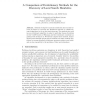Free Online Productivity Tools
i2Speak
i2Symbol
i2OCR
iTex2Img
iWeb2Print
iWeb2Shot
i2Type
iPdf2Split
iPdf2Merge
i2Bopomofo
i2Arabic
i2Style
i2Image
i2PDF
iLatex2Rtf
Sci2ools
92
Voted
AUSAI
2005
Springer
2005
Springer
A Comparison of Evolutionary Methods for the Discovery of Local Search Heuristics
Abstract. Methods of adaptive constraint satisfaction have recently become of interest to overcome the limitations imposed on “black-box” search algorithms by the no free lunch theorems. Two methods that each use an evolutionary algorithm to adapt to particular classes of problem are the CLASS system of Fukunaga and the evolutionary constraint algorithm work of Bain et al. We directly compare these methods, demonstrating that although special purpose methods can learn excellent algorithms, on average standard evolutionary operators perform even better, and are less susceptible to the problems of bloat and redundancy.
Adaptive Constraint Satisfaction | Artificial Intelligence | AUSAI 2005 | Evolutionary Algorithm | Evolutionary Constraint Algorithm |
Related Content
| Added | 13 Oct 2010 |
| Updated | 13 Oct 2010 |
| Type | Conference |
| Year | 2005 |
| Where | AUSAI |
| Authors | Stuart Bain, John Thornton, Abdul Sattar |
Comments (0)

